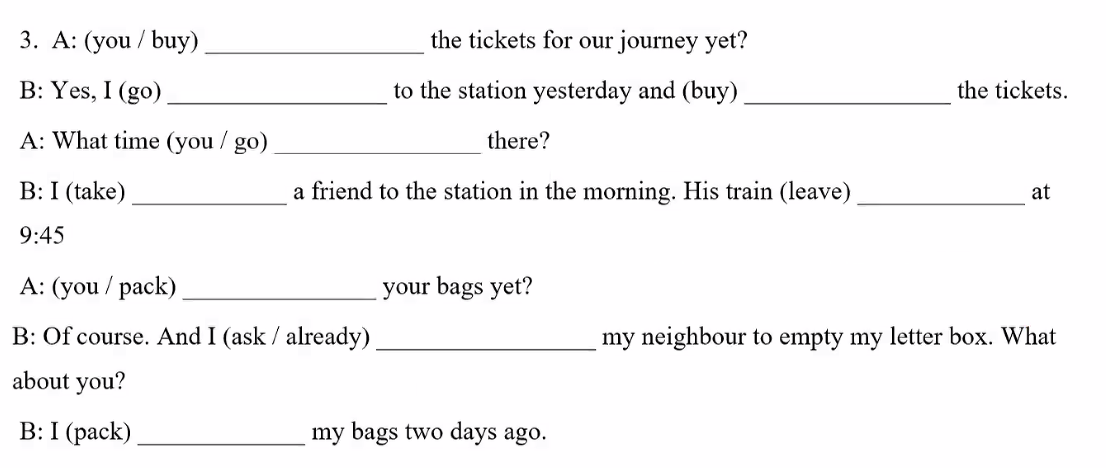Hoàn thành các bài tập và các câu sau với thì hiện tại hoàn thành và quá khứ đơn
Bài tập 1:
1) The police....................two people early this morning. (arrest)
2) She...........Japan but now she...............back. (go - come)
3) Dan....................................two tablets this year. (already/ buy)
4) How many games...................so far this season? (your team/ win)
5)................the CN Tower when you.................................in Toronto? (you/ visit - stay)
6)....................your homework yet? – Yes, I....................it an hour ago. (you/ do - finish)
7) There...................an accident in High Street, so we have to use King Street to get to your school. (to be)
8) I...............Peter since I...............last Tuesday. (not/ see - arrive)
9) Frank..................his bike last May. So he...................it for 4 months. (get - have)
10) I'm sorry, I..................earlier, but I..................a lot lately. (not/ write - work)
Bài tập 2:
1) Peter............... football yesterday (play)
2) They................. the car. It looks new again. (clean)
3) Last year we.................. to Italy. (be)
4) John and Peggy...................... the book. Now they can watch the film. (read)
5) I................. my friend two days ago. (meet)
6) We never…………….... another country before. (visit)
7) She......................... a new car in 2011. (buy)
8) I'm sorry, but I........................... my homework. (forget)
9)............you.................. the game of chess? (win)
10) The girls........................ their lunch yet. (eat)
Bài tập 3
1) I.................my keys, so I can't open that door. (lose)
2) Columbus........................in the New World in 1492. (arrive)
3) Nina..........................her leg. She is still in hospital. (break)
4) He............................here all his life. (live)
5) Colin........................for Brazil this morning. (leave)
6) Last winter Robin..........................with his father in the Alps for three days. (stay)
7) Ellen..........................with her left hand. (always/ write)
8) She...............................a language course in Paris last summer. (do)
9)......................anyone...........................yet? (phone)
10) I.................Paul today, but I.................him last Sunday. (see)


1. went
2. drove
3. arrived
4. have drunk
5. played
6. told
7. have walked
8. have seen
9. stopped - bought
10. have worked (đoán dùng từ "work")
11. have just visited
12. went
13. had
14. was
II/. SIMPLE PAST OR PRESENT PERFECT TENSES
1. Last Monday, I (go)___went___ to the restaurant with a client.
2. Yesterday, we (drive) ___ drove___ around the parking lot for 20 mins to find a parking space.
3. When we (arrive) ____arrived__ at the restaurant, the place was full.
4. These boys ( drink ) .....have drunk................ a lot of apple juice recently.
5. We ( play ) .......played....... volleyball with our best friends three days ago.
6. Last night, the waitress (tell)__told____ us to come back in two hours.
7. My client and I slowly (walk) __walked____ back to the car 2 hours ago.
8. we (see) ____saw__ a small grocery store.
9. We (stop) stopped in the grocery store and (buy) ___bought___ some sandwiches.
10. His father.........has worked.............in that factory recently.
11. I __have__ just ....visited ....... my aunt in Ha Noi ( visit )
12. Angela ____went___ to the cinema last night ( go )
13. My friends ____had____ a great time in Nha Trang last year ( have )
14. My last vacation in Hue ___was____ wonderful. ( be )